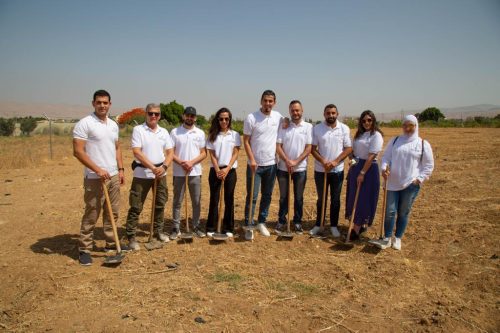مرايا – بمناسبة اليوم العالمي لمكافحة التصحر والجفاف والذي يصادف 17 حزيران من كل عام، شارك موظفو البنك الأردني الكويتي، في مبادرة القافلة الخضراء بالتعاون مع الجمعية العربية لحماية الطبيعة، بزراعة 200 شجرة مثمرة في منطقة الأغوار الوسطى، حيث يحرص البنك وبشكل مستمر على تكريس كل إمكانياته وتوجيه العاملين لديه للمشاركة بفعالية في مختلف المبادرات الرامية لخدمة المجتمع والبيئة، وضمن هذه الرؤية وفي هذا الاتجاه وللحفاظ على التنوع البيئي في الأردن ومكافحة التصحر وزيادة الرقعة الخضراء يأتي هذا الدعم من البنك الأردني الكويتي ، رافداً لبرنامج الجمعية العربية لحماية الطبيعة “القافلة الخضراء” في الأردن، الهادف لدعم صغار المزارعين، وتعزيز قدرتهم على الإنتاج خصوصاً في منطقة الأغوار التي تعتبر سلة الأردن الغذائية، عبر توفير الأشجار المثمرة لهم بشكل أساسي، والتي تعود بعائد اقتصادي يحسّن من ظروفهم المعيشية، ويسهم في أمنهم الغذائي على المستوى الخاص في أسرهم، وعلى المستوى العام في زيادة الناتج الزراعي في المملكة، إضافة للأثر البيئي الإيجابي في تخضير المساحات القابلة للزراعة في الأردن، ووقفاً للتصحر، والتقليل من أثر انبعاثات ثاني أكسيد الكربون.
Jordan Kuwait Bank’s Employees Participate in Tree Planting with the
Arab Group for the Protection of Nature
maraya – On the occasion of the World Day to combat desertification and drought, which falls on June 17 of each year, Jordan Kuwait bank employees participated Jordan Kuwait Bank’s (JKB) employees participated in the ‘Green Caravan Initiative’ in collaboration with the Arab Group for the Protection of Nature (APN), where they planted 200 trees in the Jordan Valley area. Within this vision and direction of protecting Jordan’s biodiversity and green expansion zones, JKB is keen to dedicate all its possibilities and guide its employees to actively participate in various initiatives aimed at serving the community and the environment. This is part of Jordan Kuwait Bank’s support for APN’s program “Green Caravan” in Jordan, that aims to increase capacity by helping smallholders and increasing economic dividend, primarily by providing fruit-bearing trees, especially in the Jordan Valley area. In addition to the positive environmental impact of Jordan’s arable lands on greenery to reduce the impact of desertification moratorium and CO2 emissions, it contributes to their living conditions, food security, and the Kingdom’s agricultural production.

